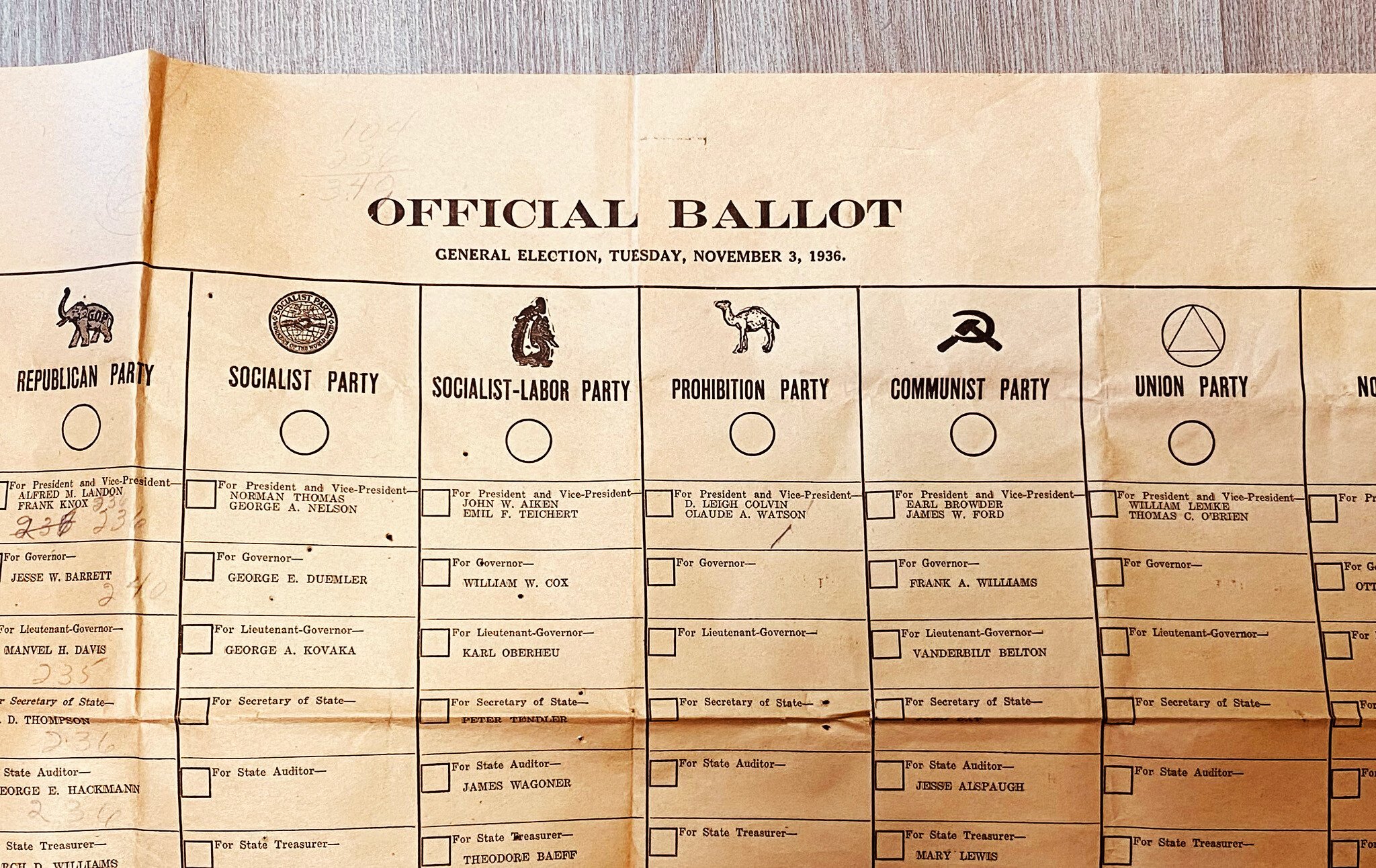
In a Functioning Democracy, Third Party Candidates Would Flourish
RFK Jr., Cornel West, Jill Stein, and others should be on ballots everywhere. “Defending democracy” rings hollow if elections are being rigged by both major parties.
There’s a fascinating artifact in the Current Affairs offices that I once bought for use in a magazine photoshoot. It’s an original Missouri election ballot from 1936. It lists the various parties you can vote for: Democratic, Republic, Socialist, Socialist-Labor, Prohibition, Communist, Union, as well as “non-partisan.” A few things are striking about this ballot. First, it’s simple (no weird “butterfly ballot” design). It’s also kind of remarkable to see a hammer-and-sickle printed on an official U.S. government document, a reminder of what a different political climate there was in the 1930s at the peak of the “Old Left.” One also can’t but sigh seeing three different leftist parties on the ballot, in classic People’s Front of Judea / Judean People’s Front style.
I don’t know what the process of getting on the ballot in Missouri in 1936 was like. But it must have been easier than it is to get on the ballot in many states in 2024. The New York Times has a new report on the trouble that independent presidential candidate Robert F. Kennedy Jr. has had getting on the ballot. His campaign has been “spending heavily, amassing steep debts and resorting to layoffs as it becomes almost singularly focused on the costly effort of placing his name on state ballots,” and trying to get on the ballot has “left little money for events and other traditional campaign priorities.”
The campaign has had to pay millions upon millions of dollars to try to get on state ballots, because it’s “an expensive and time-consuming endeavor that requires gathering hundreds of thousands of signatures.” That’s before the legal costs. In New York, for instance, the Democratic National Committee has backed lawsuits to keep Kennedy off the ballot, challenging the signatures collected by his campaign. In many states, the requirements for independent candidates are next to impossible to meet: “For example, an independent candidate seeking a spot on Texas' 2024 ballot has about two months to gather 113,151 signatures of registered voters ‘who did not vote in the presidential primary of either party.’” Sometimes, even jumping through all the hoops isn’t enough. North Carolina’s Board of Elections denied RFK Jr., Cornel West, and Randall Terry access to the ballot even though they had collected enough signatures, with Democratic members of the board opposing access and Republican members supporting it. [Note: Sept. 4, 2024, RFK Jr. has dropped out of the race since this article was published.]
RFK Jr. can afford to spend millions fighting to secure ballot access, in part because he has a wealthy running mate, Silicon Valley lawyer Nicole Shanahan, who gave the campaign $8 million in April alone. Even so, he’s only on the ballot in seven states so far. An independent candidate without wealthy benefactors has very little hope. And if you can’t get ballot access, you can’t get into the debates. It’s easy to see how this makes it difficult for an independent candidacy to catch fire: if a third candidate had been on the debate stage with Trump and Biden recently, it might well have ignited their popular support, but without preexisting popular support they can’t get ballot access, without which they can’t appear at the debate. Is it any wonder that the only third party candidate to gain traction in a presidential election in living memory (Ross Perot, who received nearly 20 percent of the popular vote in 1992) was a billionaire?
Kennedy and West face heightened obstacles because they are independent candidates unaffiliated with one of the “major” third parties (Green, Libertarian). But while the Green and Libertarian candidates will be on more ballots in November, the efforts to thwart them are absolutely ruthless. In 2022, Connor Harney wrote a downright shocking account for Jacobin of the lengths that Democrats in North Carolina went to in order to keep the Green Party off the ballot. In April of that year, he casually signed a petition collected by a Green Party canvasser to help them achieve ballot access. In June, he received a text asking him to remove his name, because the Greens threatened the Democrats’ electoral chances. Then someone was sent to his house to request that he remove his name! The Carolina Journal obtained audio of a shady operative claiming to be from the Green Party itself asking someone who had signed the petition to remove their name because “we’ll take votes away from Democrats, giving Republicans a huge advantage.” That year, North Carolina Democrats sued to try to keep anyone from being allowed to vote for the Green Party. (The Democrats were ultimately forced to pay the Greens’ legal expenses for the frivolous challenge that involved Harney and other petition signers.) These shenanigans go on all over the country, with Democrats putting effort and expense into keeping Greens from competing.
Now, you know the argument they make: Green Party and independent candidates are “spoilers.” Democrats argue that the threat posed by the right (which is quite real) means that voting third party empowers the right. I have actually made a version of that argument myself, but it’s important to realize that when we’re talking about ballot access, separate issues arise. In a fair democratic process, if you want to make the argument to voters that their third party or independent vote will ultimately have a negative effect, you can make that argument. But denying ballot access very different. It’s effectively ensuring an argument doesn’t even need to be made. Instead of trying to persuade people to make a certain choice, you’re ensuring that they don’t have a choice in the first place. Certainly, that makes it easier to achieve the desired outcome. It just happens to involve subverting democracy.
I shouldn’t even have to point out that I think Robert F. Kennedy Jr. is a crank and a liar whose populism is phony. His response to a recent sexual assault allegation (“I am who I am”) was appalling, and he’s currently generating headlines like “RFK Jr. denies eating a dog while sidestepping sexual assault allegations…” But all of that is irrelevant. In a democracy, the people pick the president. RFK Jr. is drawing about 10 percent of the vote in a lot of polls. If he had been allowed into the recent debate, I imagine that percentage would have increased substantially, given the performance of the Democratic and Republican candidates at that debate. He might have been a real competitor. I don’t think that would be a “good thing” for the country, but I also don’t think the candidacies of Donald Trump and Joe Biden are a good thing. Whether something should be allowed to happen is different from whether you think it’s a good thing. That’s what freedom is. In a democracy, people have to be allowed to make choices that you personally would not make. If I had been voting in Florida in 2000 or 2004, I would not have voted for Ralph Nader, because I do believe that in a swing state (but only in a swing state), it’s important to make sure Republicans don’t win. But excluding him from the debates was the kind of move that brings us closer to being an authoritarian country rather than a democratic one.
The 2024 U.S. presidential election is currently illustrating how dysfunctional and limited our democracy is. The overwhelming majority of Democratic voters didn’t want Joe Biden as their nominee. But they were stuck with him, in part because an aggressive effort was made by party insiders to ensure that the president faced no meaningful challenge in the primary, and White House insiders maintained the fiction that Biden was fully capable of doing the job for another four years. On the other side, we have Donald Trump, whose authoritarian plans are terrifying, who outright denies the most serious crisis of our time is even happening (the climate catastrophe), and who has just been granted immunity from prosecution for a broad swath of criminal acts by a right-wing Supreme Court. I don’t think many people would argue that the choices we currently have are the choices Americans would really want, which raises the question of why, if the country is democratic, our options are so out of sync with our preferences.
There is currently talk of Democratic party insiders pressuring Joe Biden to step aside, so that those same party insiders can anoint a successor, whether Biden’s (unpopular) vice president or someone else, neither of whom will have been selected to lead the ticket by American voters. Even if Democrats do succeed in getting Biden to go away (and I hope they do), the recent embarrassing presidential debate should cause us to reflect on what an authentic democracy would look like. In a country that functioned democratically, candidates like Claudia de la Cruz and Cornel West and Jill Stein and even RFK Jr. would have meaningful opportunities to present their case to the public. Having a duopoly is producing outcomes that cannot in any real sense be called democratic. Democrats frequently argue that “democracy is on the ballot” with an open authoritarian like Trump running. I certainly agree that Trump is a threat to democracy, since he has made it clear he will reject the results of any election he does not win. But I can’t agree that Democrats are the defenders of democracy while they conspire to exclude meaningful competition from elections.






